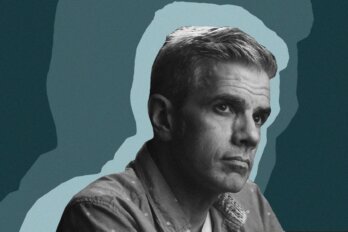Last may, Royal Canadian Mounted Police officers dropped off a thirty-six-year-old man named Justin Bone in west Edmonton. Bone, who had a difficult upbringing, trouble with substances, and a long list of past charges, had been released from custody that April on the conditions that he undergo an addiction treatment program and not be in Edmonton unsupervised. Yet the RCMP escorted him into the city seemingly without a plan—despite having been warned that he was violent and likely to reoffend, despite there being few shelter options or open addiction treatment beds available, and despite the city’s growing houseless population.
Edmonton police allege that, three days later, Bone walked through downtown’s Chinatown and beat to death two men he came upon randomly. The city’s mayor, Amarjeet Sohi, would later call on the province to work with him to fix systemic issues and make the city’s streets safer. “This situation was not a one-off, or a mistake,” he said in a statement, according to the CBC, the following month.
Instead, the province pounced. “The people of Edmonton deserve better than this city council is delivering,” Alberta justice minister Tyler Shandro (who, as of this writing, faces three counts of alleged misconduct before the Law Society of Alberta) publicly wrote to Sohi just over a week after the killings. Shandro offered Edmonton no additional money to tackle houselessness and no commitment to fix Alberta policies that deny income support to the houseless. His response also made no concession that Edmonton has been filling provincial service gaps by funding its own overdose response teams and emergency shelters and building 210 new units of supportive housing for people experiencing trauma and addictions—all while asking, often fruitlessly, for provincial help. Instead, Shandro compelled Sohi to prepare him an action plan, writing: “I look forward to reviewing this plan soon.”
Punching at another government, party, or political opponent in response to criticism is standard fare in politics, especially in current times, where leaders like to zero in on people’s divisions. But what Alberta’s United Conservative Party government has taken to doing, unlike most other provincial governments, is punch downward at its big-city mayors as if they were opposition parties. Soon after the party’s 2019 provincial win, then justice minister Doug Schweitzer labelled Naheed Nenshi, who was mayor of Calgary at the time, as “Trudeau’s mayor.” In 2022, then premier Jason Kenney dismissed urbanites and city leaders who were vocally uncomfortable with his relaxed COVID-19 health measures as the “government-funded laptop class.”
Perhaps it should surprise no one that Alberta’s provincial government and its more progressive big-city mayors have been at odds; big cities are not where the most influential conservative voters live. But under the UCP, Alberta’s provincial leaders have taken their differences to more interventionist heights for political gain. Consider that, in 2021, Kenney injected a referendum on whether to remove federal equalization from Alberta’s constitution onto the municipal election ballots. Jared Wesley, professor of political science at the University of Alberta, says it was a transparent (and ultimately unsuccessful) effort to stoke anti-Ottawa resentment and anger the right wing to vote—and to prevent progressive mayoral candidates, such as Sohi in Edmonton and Jyoti Gondek in Calgary, from winning. “You just have to engage a small group of committed people and you can take back city hall,” he says.
Consider, too, the punitive nature of it all. New UCP policies mean Alberta now withholds grants it has long given to cities in lieu of the payment of property taxes for its government buildings, despite the province running multibillion-dollar surpluses. In 2019, the UCP stripped down a deal for more funding for city transit that its New Democratic Party predecessors had agreed to with Edmonton and Calgary. It also whittled down new big-city powers under city charters. In early 2022, as Edmonton’s city council debated a municipal face-mask bylaw, the UCP government announced, even as the meeting was under way, that it had just made such a bylaw illegal. “We are . . . treated like kids by the province,” Sohi said at the meeting. “It’s a really sad day.”
UCP leaders “punch up, punch down, punch in any order to make political hay out of it,” says Zain Velji, a political consultant and commentator who has been campaign manager for Nenshi and has also worked with former Alberta premier Rachel Notley and former US president Barack Obama. “Cities are an easy punching bag. Most people don’t understand cities—how they tax, what they can do.”
This is the paradox of Canadian cities: they are so-called creatures of their provinces, legally unable to raise money through much other than outdated property taxes, grants subject to the political agendas of provinces, or the various user fees collected from sources such as public transit. This can make them the least funded of our governing trio despite being home to so many of us and playing host to the most wicked problems plaguing Canadians—including housing affordability, homelessness, social inequity, sustainable mobility, and climate change. They are the tier of government that, as a rule, must partner with others to build infrastructure or programs simply because they don’t have enough to go it alone.
But, increasingly, city leaders are challenging this powerlessness. Power is “drifting downward” from national and regional governments to cities, authors Bruce Katz and Jeremy Nowak argue in their 2018 book The New Localism: How Cities Can Thrive in the Age of Populism. This is particularly true as Canadians urbanize and our local economies transform. “New sets of leaders are upending conventional wisdom about who solves problems in an age with too much partisan conflict and not enough common purpose,” they write.
Alberta squaring off with its big cities, where around half its residents live, is the clearest example of what this drift could look like for Canada. It has generated transformational leaders like Sohi and Gondek—two first-generation immigrant Punjabi mayors who must build consensus as a rule and who were elected, in 2021, in the homeland of Canadian populism. Meanwhile, it has also entrenched the status quo more deeply. Alberta’s provincial politics is careening ever more into populist territory under its newest UCP premier, Danielle Smith, who, this spring, is seeking a UCP reelection by leaning hard on what divides Albertans in rural areas—her base—from those in cities. Issues like lingering anger over COVID-19 vaccine mandates and pandemic health measures are therefore being relitigated.
The anti-city bullying that has come to be explicit in Alberta since 2019 is not just about making life difficult for mayors like Sohi. Instead, it is yet another barrier between Canadians and effective governance. And it blocks the most important thing that cities offer in a time when leaders seem intent on focusing on grievances rather than action: getting things done for people.
Amarjeet sohi developed a love for city institutions after he immigrated to Edmonton in 1982, at the age of eighteen, and learned to speak English partly in city libraries. He’s long been an organizer: during a stint driving city buses in Edmonton’s southeast suburb of Mill Woods, he rallied fellow racialized bus drivers to demand equitable treatment. In 1988, he found himself in a jail in India because he’d joined an activist street-theatre group helping Indian farmers advocate for their rights.
Sohi’s history comes through in his politics. His election campaign was one of hope and ideas and avoided personal attacks and divisiveness as he ran against a right-wing populist and former UCP hopeful, Mike Nickel, who talked about “freedom.” Sohi won by more than 45,000 votes.
What interests him about the job, he says, is that city residents increasingly expect their municipal governments to go further than maintaining the basics, such as garbage collection and fire services. The demands—for more housing, quick action on climate change, homelessness, and combatting racism, among other things—are rising for several reasons. “One could be a lack of leadership from other orders of government,” says Sohi, who ran for a federal seat in 2015 and served as the natural resources minister in Justin Trudeau’s cabinet until 2019, when he lost his reelection bid. “I think the main reason is closeness to people.”
Sohi’s victory in Edmonton was just one wave in a 2021 tsunami of changes for Alberta’s municipal governments. Edmonton’s council now has more women than men. Gondek, in Calgary, is that city’s first woman mayor. Incumbents and conservatives lost in many races, including those in traditionally conservative strongholds. Medicine Hat’s new mayor, Linnsie Clark, is even seen as relatively progressive, by Alberta standards, and now leads the city that is partly within the provincial riding where Premier Smith chose to seek a seat in a by-election.
“To elect both Gondek and Sohi individually—but, more important, together, as a unit—to lead our two major cities, I think there’s something powerful about Alberta and about the repudiation of what Premier Kenney in that election was certainly trying to do,” Velji says. But how does this buzzy change overlap with Alberta’s deep establishment politics? Smith is popular in Alberta’s heartland because she speaks of “the unspoken issues,” wrote former member of Parliament Lee Richardson in an op-ed for the Calgary Herald. Her Alberta Sovereignty Within a United Canada Act is a prime example. Now law, it purports to give the provincial government more power to refuse to enforce any federal laws it doesn’t like. It’s a potential constitutional crisis in the form of a campaign tool.
These radical differences between provincial and municipal leaders aren’t surprising to Wesley, who identifies as biracial and leads the Common Ground project at the University of Alberta, where he studies political attitudes. He’s found that many Albertans aren’t as right wing as provincial politics would suggest. Public opinion data collected over the past decade, he says, shows a small majority of Albertans can be consistently identified as centrists. “You ask Albertans, ‘Where do you position yourself on an ideological spectrum from left to right?’ and they’ll say predominantly in the centre, centre-right, and, to a lesser extent, centre-left.” But our collective culture, he says, is still fixated on party politics.
Regular opportunities for residents to feel heard could be something of a relief valve for individual political expression. “A lot of what is animating the [trucker] convoy, if you listen carefully to folks [who were] interviewed, it’s ‘I feel voiceless, I feel powerless,’” Wesley says. “It’s tough to make that argument in Edmonton when there’s an open mic [at council meetings] just about every week on every major issue, both online and in person.”
Around half of Alberta’s 4.6 million people live in or near either Edmonton or Calgary, mirroring the urban shift transforming Canada. The makeup of who immigrates to Edmonton has also shifted slightly since the 1980s—from mostly white Europeans to non-white newcomers from India, the Philippines, and China, among other places. Though the majority of Alberta’s population remains white, Wesley thinks the changing demographics could be seen as a challenge to Alberta’s political establishment. “What I think worries the conservatives—and Jason Kenney has spent an entire career trying to build people of colour into the conservative movement—is that they know they’re outnumbered by progressive people of colour,” he says.
Even more worrisome, perhaps, is the prospect of increasingly nonpartisan voters. With a few exceptions, Canada’s municipal governments don’t involve political parties. “City tasks aren’t left or right wing; they’re practical,” Velji says. “There’s no jersey colours. It allows you to vote your heart.”
Whether they like it or not, mayors such as Sohi still have to work with provincial governments. In response to Shandro’s demand, Sohi delivered the safety plan (complete with highlights of what Edmonton has already done without much provincial help) and continued lobbying. Months later, his work paid off: last October, Kenney committed $187 million more toward houselessness in the province and addiction issues in the two largest cities. Critically, Edmonton finally got provincial funding to hire nurses for its $28 million project to build five supportive housing developments.
Still, the UCP punches keep coming. This past December, the provincial government created a Public Safety and Community Response Task Force for Edmonton. Of the task force’s twelve members, only two were from Edmonton’s city council—and both were conservative-leaning councillors. Sohi was not invited, though the city’s police chief was. In February, in a pilot project, the UCP appointed twelve new sheriffs to patrol Edmonton’s downtown. These measures still didn’t address Sohi’s goal of eradicating the root causes of unsafe city streets instead of just hiring more cops. But Sohi had no recourse.
It’s situations like these that capture the limitations of where cities stand as they assume bigger roles in Canadian politics. Any premier who wants to win over a city mayor need only dangle money in the form of grants that can be used to fund municipal services—or even look to premier Doug Ford’s new “strong mayor” bill in Ontario, which gives Toronto and Ottawa’s mayors the ability to pass bylaws, with only a minority of council support, on matters that also fall under provincial jurisdiction. And who could ever forget Ford slashing Toronto’s council size nearly by half in 2018?
Zack Taylor, a political scientist who specializes in urban political economy at Western University, says the “pre-emption” of the work of local governments by more senior ones has an entire language and scholarship in the United States. But there, he says, political culture is built from the bottom up, and cities can and do create their own policies on almost anything imaginable (think minimum wage, taxation, laws that forbid certain firearms). Canada, he says, still adheres to its British roots in taking a top-down approach to political power.
“In the US, local governments, especially big ones, are always testing the limits of their authority through litigation [and] suing other governments,” Taylor says. “We don’t really do that here. I actually don’t see a lot of evidence, across the board, of municipalities pushing the edges. They complain way more than they actually actively try to innovate.”
Canada’s big cities need to break out of the complaining mode and take more power in their hands as they become the main places where infrastructure is built, ideas are tested, and wicked problems are solved. After this current period of divisiveness, people will increasingly want results from governments, Wesley says. “I think politicians who are able to tamp down the rhetoric and get people focused on doing stuff, getting stuff done, moving forward, are the ones that are going to be the most successful electorally over the next five to ten years,” he says. “It’s not going to be the folks who are howling at the moon and throwing insults across the aisle.”




